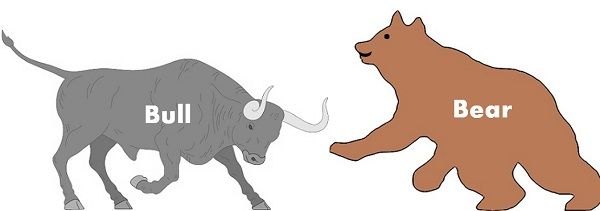 Bulls thrust up their horns while attacking the opponent, in the same way, when the market rises belligerently, it is said to be a bulls market. On the other hand, bears swipes down, their paws for attacking the opponent, likewise, when the market falls, it is known as bears market.
Bulls thrust up their horns while attacking the opponent, in the same way, when the market rises belligerently, it is said to be a bulls market. On the other hand, bears swipes down, their paws for attacking the opponent, likewise, when the market falls, it is known as bears market.
In the stock market, the terms bulls and bears are commonly encountered which indicates, how the stock market is doing, at a particular time. For the novice investors, these terms are a bit confusing, but one can easily understand the two, by analysing the attacking style of the two animals, which determines the movement of the market.
Have a glimpse of the article provided to you below, to understand the differences between bull and bear market.
Content: Bull Market Vs Bear Market
Comparison Chart
| Basis for Comparison | Bull Market | Bear Market |
|---|---|---|
| Definition | Bull market refers to the one, which grows aggressively over a period of time. | Bear market is the situation when there is a considerable fall in the market, month on month. |
| Outlook | Optimistic | Pessimistic |
| Position | Takes long position | Takes short position |
| Investor response | Positive | Negative |
| Prices of stock | High | Low |
| Stock Trading | More | Less |
| Economy | Grows | Declines |
| Market indicators | Strong | Weak |
Definition of Bull Market
The bull market is defined as a marketplace, wherein the prices of the securities go up or are anticipated to go up, over the period. This type of market encourages buying, as the conditions are favourable. The basic features of such a market are optimism, higher returns, high stock trading and investor confidence. Further, the forecasting of market trends is a bit difficult, i.e. when they will be changed.
Those investors who expect the prices to rise are called bulls, and the sentiment is known as bullish.
Definition of Bear Market
A financial market which is characterised by a consistent fall in the prices of securities is called a bear market. In this market, pessimism is prevalent, and the investors take a short position, i.e. due to the anticipation of loss by holding them, securities are sold by the investors. In the bear market, stock trading declines, returns are low, investor confidence is low, and often accompanied by the recession in the economy.
Those investors who expect the prices to fall are called bears, and the sentiment is known as bearish.
Key Differences Between Bull and Bear Market
The difference between bull and bear market can be drawn clearly on the following grounds:
- The market is considered as a bulls market when there is a rise in the overall performance of the market. Bears market is the one which undergoes a huge decline in the market performance.
- In bulls market, the outlook of the investors is optimistic. On the other hand, the investor’s view of future is pessimistic, in the bears market.
- In bulls market, the investors take a long position, i.e. they buy the security, so that when the prices go up beyond the contracted price, they make a profit. Conversely, in the bears market, the investors take a short position, i.e. they sell the security, so that when the prices go down beyond the contracted price, they make a profit.
- The investor’s response towards the bulls market is positive as the market goes up, more and more people will be attracted towards the stock market and invest their money in the hope of getting good returns. As against this, in the bears market, the response of investors is negative because due to the continuous fall, investors are afraid of investing money in the stock market.
- In bulls market, the stock prices are high, which is just opposite in the case of bears market.
- The trading of stock is high in bulls market, but in bears market, the stock trading is comparatively low.
- When the stock market is dominated by bulls, the economy grows, while, if the bears dominate the market, the economy declines.
- In bulls market, there are strong market indicators. Unlike bears market where one can find weak market indicators.
Conclusion
Investors switch to various modes on the basis of a number of factors such as global economic concerns, the financial performance of the business entity, national economic data, etc.
The market is said to be a bulls market when a rise of 20% in the whole sole performance of the stock market is observed. On the contrary, bears market is when the overall downfall of 20% in the performance, is noticed. In simple terms, when the market trend is rising, it’s bull market, whereas if there is a fall, its a bear market.






Sospeter says
smart work